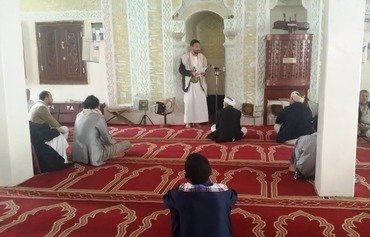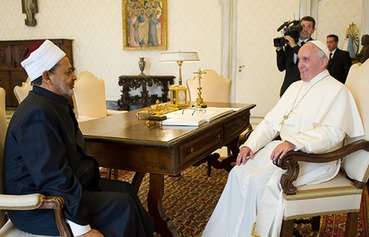Interfaith leaders in Bahrain this week joined Muslim clerics during the fasting month of Ramadan in rejecting all acts of violence committed in the name of religion, and shared the significance of fasting in their various faith traditions.
In a joint statement issued at the June 20th "Fast for Peace", held at the International Peace Institute Middle East and North Africa office in Manama, the 20 leaders called on followers of all faiths to "stand together and openly express their categorical rejection and act against violent extremism and all forms of sectarianism, hostility, exclusion and discrimination".
They agreed that while different religions have their own traditions related to fasting, the philosophy behind these practices is universal—the elimination of poverty, hunger and inequality.
Fasting also means abstaining from all sorts of violence, aggression and discrimination, they said, calling on educational, spiritual and cultural institutions to promote the "fasting commandments of peace" enshrined in all faiths.
The importance of fasting
The statement is "a universal message to focus on the importance of fasting in all religions as a means of [instilling] self-restraint and turning away from the evils of violence and extremism", said Ibrahim Nonoo, a representative of the Jewish community in Bahrain.
"Bahrain has a society that is one of its kind in the world in unifying all religions on one land and living in love, peace and goodness," he told Al-Shorfa.
"The best way to reach young people and prevent them from being lured to the scourge of extremism is to communicate with them, identify their needs, and visit schools and universities on a regular basis to educate them about the dangers of extremism and answer all their questions in this regard," he said.
"Fasting is not only about refraining from eating and drinking," said the Rev. Hani Aziz, pastor of the National Evangelical Church in Bahrain.
"It is rather sharing livelihoods with the poor, breaking the barriers of bondage, elitism and arrogance, disseminating the principles of justice and drawing closer [...] to God," he told Al-Shorfa.
"Inner peace that comes from fasting will fill the hearts, and after that you will be able to spread it to others and live in peace and harmony with everyone without discrimination or violence," he said.
Rejecting violence and extremism
Fasting disciplines the soul, fosters communication among humans and compassion towards the needy and promotes peace, said Sheikh Salah al-Jowder, preacher at the al-Khair mosque in Bahrain.
Al-Jowder urged people of all religions and sects to fast, "both as a fulfillment of a divine duty and out of personal will".
This will help in feeling the needs of others and rejecting violence and extremism in all their "abhorrent forms", he told Al-Shorfa.
"All religious pulpits are required to continue their commitment to serve peace in order to defeat terrorism and extremist ideas," he said.
"This can be achieved through the promotion of the values of education, equality between the sexes and interfaith dialogue, while upholding the universal concepts of fasting, including working to eradicate poverty, hunger and injustice," al-Jowder said.

![Twenty interfaith clerics reiterated the peace commandments of fasting at a June 20th 'Fast for Peace' meeting in Manama. [Mohammed al-Jayousi/Al-Shorfa]](/cnmi_am/images/2016/06/24/5670-Bahrain-fasting-peace-600_384.jpg)






